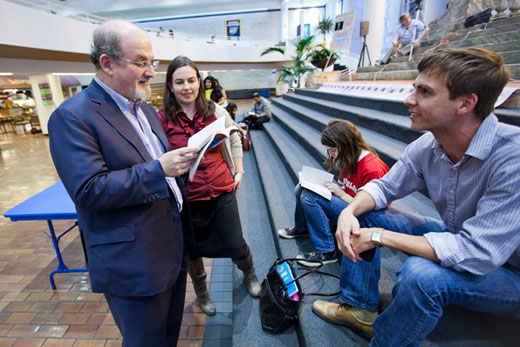Updated Nov. 1
Though tickets are no longer available to this event, names may be placed on a waitlist to receive a small number of tickets that may be returned. No standby tickets will be available on Sunday. For ticket holders, a limited number of autographed copies of “Joseph Anton: A Memoir,” may be available for sale at the event.
Salman Rushdie, University Distinguished Professor at Emory University, will discuss his latest book, “Joseph Anton: A Memoir” at 6:30 p.m. Sunday, Nov. 4 at Glenn Memorial Auditorium.
Tickets are required and are available online. A minimum of 500 free tickets are available for Emory faculty, staff and students, limit two per person. A waitlist will be available once the ticket allotment is exhausted.
For the public, a limited number of autographed copies of “Joseph Anton: A Memoir” may be purchased through Emory’s Barnes & Noble bookstore via a special link on the ticket website. These copies include a free ticket to the event. Autographed copies are $30 (list price), and will be available for pickup at the Nov. 4 event. Purchasers will receive a ticket and sales receipt by mail. Both are required to receive an autographed book and for event admission.
Members of the public who wish to attend the event but do not wish to purchase an autographed copy of the book can sign up for a waitlist for the remaining free tickets. The author will not be available to sign additional books or items at the event.
Widely regarded as one of the greatest writers of our time, Rushdie won critical acclaim for his second novel, “Midnight’s Children,” and worldwide fame after Ayatollah Khomeini of Iran called for his death following the publication of “The Satanic Verses” in 1988. In “Joseph Anton: A Memoir,” Rushdie writes for the first time about his years in hiding during the fatwa.
Rushdie at Emory
As University Distinguished Professor, Rushdie spends time each year on campus teaching, presenting public lectures and engaging with the academic community. Rushdie’s formal affiliation with Emory began in 2006, when he was named Distinguished Writer in Residence and placed his archive at the university. Rushdie has said that having his archive organized and housed at Emory’s Manuscript, Archives and Rare Book Library (MARBL) allowed him to write his memoir.
In 2010, Rushdie’s archive at Emory opened to the public for the first time. The archive encompasses not only the author’s manuscripts, drawings, journals, letters and photographs, but also an array of digital materials, including several computers, which hold the complete digital environments in which Rushdie produced his work.
The Rushdie archive expands the international flavor of MARBL’s extensive literary collections, and while it represents the most complete set of born-digital records held to date, it also has paved the way for the acquisition and processing of other collections with born-digital content.
Awards, honors
Rushdie has received numerous awards, including the Whitbread Novel Award, which he has won twice, and the Booker of Bookers Prize, which was awarded to “Midnight’s Children” as the best novel to win the Booker in its first 25 years. “Midnight's Children” also was honored with the Best of the Booker Prize in 2008 as the greatest Booker prizewinner in the history of the award.
In 2007, he was knighted in recognition of his contributions to literature. He became a member of the American Academy of Letters in 2008 and holds the rank of Commandeur in the Ordre des Arts et des Lettres, France’s highest artistic honor.
Between 2004 and 2006, he served as president of PEN American Center, and continues to work as president of the PEN World Voices International Literary Festival, which he helped to create.
His books have been translated into more than 40 languages. Films of “Midnight’s Children” and “Haroun and the Sea of Stories” are currently in production.

